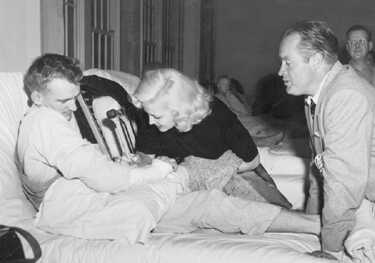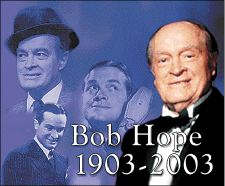Hope's 'Secret Life' not so funny ...
Marx's book tells of tormenting writers,
liaisons with women
Reviewed by KATE SEAGO, Los Angeles Daily News, 23-Oct-1993
LOS ANGELES -- At 90, Bob Hope is an icon of the golden age of Hollywood,
perceived as a hero by many because of his patriotic forays to war zones to
entertain American troops in four wars.
In his new biography, "The Secret Life of Bob Hope" (Barricade; $21.99),
writer Arthur Marx -- Groucho's son -- acknowledges Hope's place in the
Hollywood pantheon. But he also portrays the private Hope as a determined
man who elbowed his way out of an impoverished childhood to create a
persona that made him rich and famous -- and lured to his bedroom some of
the most beautiful women in Hollywood.
Among the allegations that have Hollywood insiders reaching for the index
to see if they're named in the book:
That Hope's screen persona of the leering lecher is closer to his real
personality than is his carefully groomed public image, and that he bedded
not only local trollops but Las Vegas showgirls and some of his film
co-stars, also.
 Marx alleges that these activities continued into the mid-1980s. His list
of Hope's liaisons includes Rhonda Fleming, Gloria DeHaven, Janis Paige,
Joey Heatherton, Marilyn Maxwell (in photo with Hope), Barbara Payton, Johnine Leigh Avery (Miss
World USA 1968) and pro golfer Jeanne Carmen.
Marx alleges that these activities continued into the mid-1980s. His list
of Hope's liaisons includes Rhonda Fleming, Gloria DeHaven, Janis Paige,
Joey Heatherton, Marilyn Maxwell (in photo with Hope), Barbara Payton, Johnine Leigh Avery (Miss
World USA 1968) and pro golfer Jeanne Carmen.
Other allegations:
That a female publicist who was also a Hope paramour committed suicide
after he fired and rejected her.
That Hope and Bing Crosby used to trade casual sex partners, each
introducing the other to women they thought were particularly good in bed.
That Hope rented apartments near his Toluca Lake home so he could visit
his mistresses during his midnight strolls.
That Hope tormented his underpaid writers with middle-of-the-night
demands for fresh "ad libs," and tossed their paychecks -- folded into
paper airplanes -- down to them from the balcony of his office to watch
them scramble for their money.
That Dolores Hope, a devout Catholic, was aware of her husband's
philandering but, for the most part, looked the other way.
That Hope was secretly married to an early stage partner, before his
six-decade marriage to Dolores -- and that a daughter, financially
supported by the Hopes, may have been born from that earlier union.
That Hope's real estate timing -- he shrewdly bought up thousands of
acres in the San Fernando Valley in the 1950s -- was as finely honed as his
comedy.
Angry and upset
If Hope himself has taken note of the furor, he has done so in private.
Hope spokesman Ward Grant said recently, "The Hopes still will not dignify
this book with a response. For my own part, I'm angry, upset."
Grant also told the Associated Press last week that there would be no
comment but went on only to describe the book as "just a lot of old stuff,
nothing new."
During an interview, Marx conceded that some of the information is old but
said it never has been put in a book.
"(Several previous biographers) told me that their publishers had asked
them not to put any of this stuff in," he said.
But Marx does not know whether the prohibition came from the publishers
themselves, or whether Hope had used his influence to prevent publication.
"Hope did have a strong hand, reaching out, stopping a lot of (negative
information). But I guess either his hand is weakening now, or he doesn't
give a damn," he said.
"I think he's controlled everything pretty well," Marx said. "I'm
surprised he's kept his people who work for him quiet. A good source I've
found were the writers."
Writing for Bob Hope was a specialized skill, "sort of like writing a
sitcom," Marx said. "My father once said, 'He's not really a comedian, but
he's a good translator of other people's jokes.' "
Over the years, Hope has used reams of gags from an army of writers.
"He'd rather have 10 cheap writers than two expensive writers," Marx said,
"but there was a period where he wasn't getting what he liked, and he
hired three or four more-expensive writers. But he always ended up having
outside writers and people sending him jokes -- and all these jokes ended
up in your script, and they didn't fit the characters you'd written.
"He didn't feel secure without a joke. That's the insecurity of the
comedian."
Over the hill
Marx and his writing partner, Bob Fisher, worked on four films for Hope:
"Eight on the Lam," "A Global Affair," "I'll Take Sweden" and "Cancel My
Reservation," which Marx said was the second to last picture Hope made. "I
can't say they were his worst pictures, but they weren't very good," Marx
said. "It was just, I thought, that he was a little over the hill for
making those kind of movies."
Marx recounts those experiences in detail in "The Secret Life of Bob Hope,"
and he gained insights for the book from the contacts he made at that time.
"The fact that I had a personal relationship helped," he noted, "because I
was able to recount things that Louis Shurr, his agent, had told me about
Hope and his women -- never knowing I was going to write a book about it."
In fact, Marx first tried to write a book about Hope in the early 1970s.
"I was going to do a book for Norton. But they came to me and said we would
prefer that I don't do the bad things about him. And I said, well, then,
what's the point of writing a book? I don't want to do another book
that's just, 'I was a big hit here, I was a big hit there.'
"If you don't want me to do an honest biography about him, I won't do it
at all."
Marx switched the topic of his book contract to Sam Goldwyn, and the Hope
project was shelved.
He suggested the Hope book again in 1986 and 1987. "I had a good outline on it," he remembered, but his agent "didn't seem to be able to get any
interest in it from the publishers. I guess nobody wanted to attack this
idol, this icon."
Body of work
Marx found a large body of work about Hope's life, including a detailed
biography, by former Hope spokesman William Faith.
"To tell the truth, when I first started to do this, I almost said, 'Maybe
I shouldn't write this book, there are so many books about him,' " Marx
recalled. But a thorough reading told him that the entire story -- and
especially the role of the women in Hope's life -- was still to be told.
Marx believes that the book that finally emerged is a fair portrayal of
Hope's complicated life. "I don't consider myself attacking him, but I
did try to tell the truth about him."
As the son of Groucho Marx, the author was familiar with Hope long before
he wrote for the comedian. "I remember him coming to our house once when we
lived in Beverly Hills. I was about 13 or 14. I remember him sitting in our
playroom talking to my father."
But Marx said it was difficult to feel close to Hope.
"He was sort of bright, but everyone I know felt that he was a kind of cold
person, not the warm person that you think you see on television. Not
standoffish or unfriendly . . . aloof. Let's say it this way: 'Cold like a
killer.' If he didn't like you, he'd fire you."
Marx attributed this distance to a problem stemming from Hope's early
poverty, as one of the younger sons of a large family. Hope's father was
an alcoholic, and his mother took in boarders to support the family.
But Marx does not denigrate Hope's talent.
"I think he was very funny in the beginning. I think he was great with
Crosby when they were doing the Road pictures -- although they did too
many of them, which is what always happens with sequels. I think "The Facts
of Life," with Lucille Ball, was a very funny picture. And I think he did
the Academy Awards better than anyone I've seen, when he was good and
sharp."
Marx expects mixed reviews from Hope's wide audience.
"Some of the older people who felt he did a magnificent job in World War II
-- and he did a good job of entertaining the troops -- probably think I
attacked him unfairly. Although I don't know if they all will . . . But I
think the younger people will like what I've written."
And how does he think Hope will feel about the book? "I don't know if
he'll read it. I think he's going to ignore it. I think he'll do what
he's done so far.
"I hope he doesn't show it to Dolores. Even though she knows it, she
probably won't like it. There's something about seeing something in print
that hits you more than just hearing about it."
But, Marx, said, "I wasn't really out to attack him. I just wanted to tell
the story that nobody really knew, except for a few people."
And, he asserted: "It's a fair book. I think it's a true picture of his
life. Let someone else judge whether I've hurt his image or not. I don't
think I have, and I don't think you can, he's so big. But I think a lot
of people will read the book -- at least I hope so."
How did Bob and Bing meet?
 Marx alleges that these activities continued into the mid-1980s. His list
of Hope's liaisons includes Rhonda Fleming, Gloria DeHaven, Janis Paige,
Joey Heatherton, Marilyn Maxwell (in photo with Hope), Barbara Payton, Johnine Leigh Avery (Miss
World USA 1968) and pro golfer Jeanne Carmen.
Marx alleges that these activities continued into the mid-1980s. His list
of Hope's liaisons includes Rhonda Fleming, Gloria DeHaven, Janis Paige,
Joey Heatherton, Marilyn Maxwell (in photo with Hope), Barbara Payton, Johnine Leigh Avery (Miss
World USA 1968) and pro golfer Jeanne Carmen.

